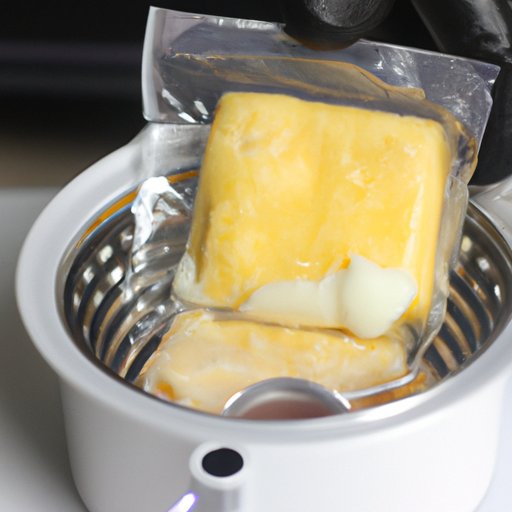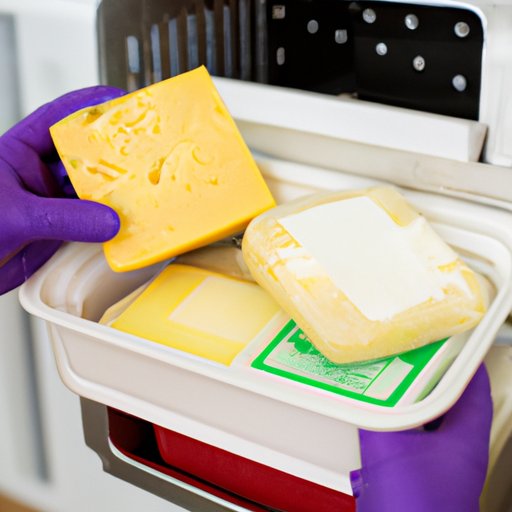Introduction
Cheese is a popular and versatile food that can be enjoyed in many different ways. But did you know that cheese can also be stored in the freezer? Many people are surprised to learn that cheese can be frozen, but the truth is that it can be done successfully, with the right preparation and storage methods. In this article, we will explore the topic of does cheese freeze well, and provide a comprehensive guide to freezing, storing and reheating cheese.

A Guide to Freezing Cheese: What Types of Cheese Freeze Well
When it comes to freezing cheese, not all types of cheese are created equal. Some cheeses freeze better than others, so it’s important to understand which types of cheese freeze well and which do not. Generally speaking, hard cheeses like cheddar, Parmesan, and Swiss are best suited for freezing, as they have a low moisture content and are less likely to become crumbly or grainy when thawed. Soft cheeses such as Brie, Camembert, and Ricotta are more difficult to freeze due to their high moisture content, but they can still be frozen with some success.
Hard Cheeses
Hard cheeses like cheddar, Parmesan, and Swiss are ideal for freezing because they have a lower moisture content. When these cheeses are frozen, the proteins and fats remain largely intact, resulting in a cheese that is still firm and flavorful when thawed. Hard cheeses are also easy to grate or cube before freezing, making them easier to use in recipes after being thawed.
Soft Cheeses
Soft cheeses like Brie, Camembert, and Ricotta are more challenging to freeze due to their high moisture content. These cheeses can become crumbly or grainy when thawed, so it’s important to take extra care when preparing them for freezing. It’s best to wrap these cheeses tightly in plastic wrap before freezing, and to consume them within two to three months of freezing.
Semi-Soft Cheeses
Semi-soft cheeses like Gouda, Havarti, and Monterey Jack are somewhere in between hard and soft cheeses when it comes to freezing. These cheeses have a moderate moisture content, so they can be frozen successfully with the right preparation and storage techniques. The key is to make sure the cheeses are wrapped tightly in plastic wrap or vacuum sealed before freezing, and consumed within two to three months of freezing.
How to Store Cheese for Long-Term Use: Tips for Freezing Cheese
Freezing cheese can be a great way to store it for long-term use, but there are some important steps you should take to ensure the cheese stays fresh and flavorful. Here are some tips for freezing cheese:
Wrapping Cheese in Plastic Wrap
It’s important to wrap cheese tightly in plastic wrap before freezing to prevent it from drying out and becoming crumbly or grainy. Be sure to use several layers of plastic wrap to seal in the moisture and keep out any air or moisture that could cause the cheese to spoil.
Vacuum Sealing Cheese
Vacuum sealing cheese is another great way to preserve its freshness and flavor. Vacuum sealing removes air from the package, which helps to prevent the growth of bacteria and keeps the cheese from drying out. Vacuum sealed cheese can last up to six months in the freezer.
Labeling and Dating Cheese
It’s important to label and date any cheese that you freeze. This will help you keep track of when the cheese was frozen and when it needs to be consumed by. Be sure to use a permanent marker or label maker to clearly label and date the cheese.
The Pros and Cons of Freezing Cheese
Freezing cheese can be a great way to extend its shelf life and enjoy it at a later date. However, there are both pros and cons to freezing cheese, so it’s important to consider these before deciding whether or not to freeze your cheese.
Benefits of Freezing Cheese
One of the main advantages of freezing cheese is that it can extend its shelf life. Cheese that has been properly frozen and stored can last up to six months in the freezer. Freezing cheese also makes it easier to grate or cube, which can be useful for certain recipes. Finally, freezing cheese can save money, as it prevents cheese from going bad before you have a chance to use it.
Disadvantages of Freezing Cheese
Although freezing cheese can be a great way to extend its shelf life, it can also affect its texture and flavor. Soft cheeses can become crumbly or grainy when thawed, and hard cheeses can lose some of their flavor. Additionally, some cheeses simply don’t freeze well, so it’s important to research which types of cheese freeze best before attempting to freeze them.

How to Reheat Frozen Cheese: Tips for Making It Taste Delicious
Once you’ve frozen your cheese, you may be wondering how to reheat it so it tastes delicious. Here are some tips for reheating frozen cheese:
Thawing Frozen Cheese
The first step in reheating frozen cheese is to thaw it. Place the cheese in the refrigerator overnight to thaw slowly and evenly. Once the cheese has thawed, it can be reheated using a microwave or an oven.
Using a Microwave to Reheat Cheese
If you’re in a rush, you can use a microwave to quickly reheat frozen cheese. Place the cheese on a microwave-safe plate and heat for 30 seconds at a time until the cheese is heated through. Be sure to stir the cheese periodically to ensure it heats evenly.
Using an Oven to Reheat Cheese
For a more thorough reheating, you can use an oven to reheat frozen cheese. Preheat your oven to 350°F and place the cheese on a baking sheet. Bake for 10 minutes, or until the cheese is heated through. Be sure to stir the cheese occasionally to ensure it reheats evenly.
Is it Safe to Freeze Cheese? Exploring the Benefits and Risks
While freezing cheese can be a great way to extend its shelf life, it’s important to understand the potential risks associated with freezing cheese. Here are some safety issues to consider before freezing cheese:
Safety Issues Associated with Freezing Cheese
When it comes to food safety, there are several factors to consider before freezing cheese. Freezing cheese can increase the risk of contamination, as bacteria can grow more easily in cold temperatures. Additionally, freezing cheese can reduce its nutritional value, as some vitamins and minerals are lost during the freezing process.
Factors That Affect the Safety of Freezing Cheese
There are several factors that can affect the safety of freezing cheese, including the type of cheese, the length of time it is frozen, and how it is stored. Hard cheeses are generally safer to freeze than soft cheeses, and cheese that is stored properly (in airtight packaging) is less likely to become contaminated. Additionally, cheese should be consumed within two to three months of freezing to ensure it is safe to eat.
How to Prepare Cheese for Freezing: Step-by-Step Instructions
If you’re planning on freezing cheese, it’s important to prepare it properly to ensure it remains fresh and flavorful. Here are some step-by-step instructions for preparing cheese for freezing:
Removing Excess Moisture
Before freezing cheese, it’s important to remove any excess moisture. This can be done by patting the cheese dry with a paper towel or placing it in the refrigerator overnight to allow the moisture to evaporate. Removing excess moisture will help prevent the cheese from becoming crumbly or grainy when thawed.
Slicing, Cubing or Grating Cheese
Depending on how you plan to use the cheese after it has been thawed, it may be necessary to slice, cube or grate the cheese before freezing. This will make it easier to use the cheese in recipes after it has been thawed. It’s important to note that grated cheese tends to freeze better than sliced or cubed cheese.
Packaging Cheese for Freezing
Once the cheese has been prepared, it’s important to package it properly for freezing. Cheese should be wrapped tightly in plastic wrap or vacuum sealed to keep out any air or moisture that could cause the cheese to spoil. It’s also important to label and date the cheese so you know when it was frozen and when it needs to be consumed by.
Conclusion
Cheese can be frozen successfully with the right preparation and storage methods. Hard cheeses like cheddar, Parmesan, and Swiss are best suited for freezing, while soft cheeses like Brie, Camembert, and Ricotta can be frozen with some success. It’s important to wrap cheese tightly in plastic wrap or vacuum seal it before freezing, and to label and date the cheese so you know when it was frozen and when it needs to be consumed by. With the right preparation and storage techniques, you can successfully freeze cheese and enjoy it at a later date.
(Note: Is this article not meeting your expectations? Do you have knowledge or insights to share? Unlock new opportunities and expand your reach by joining our authors team. Click Registration to join us and share your expertise with our readers.)
